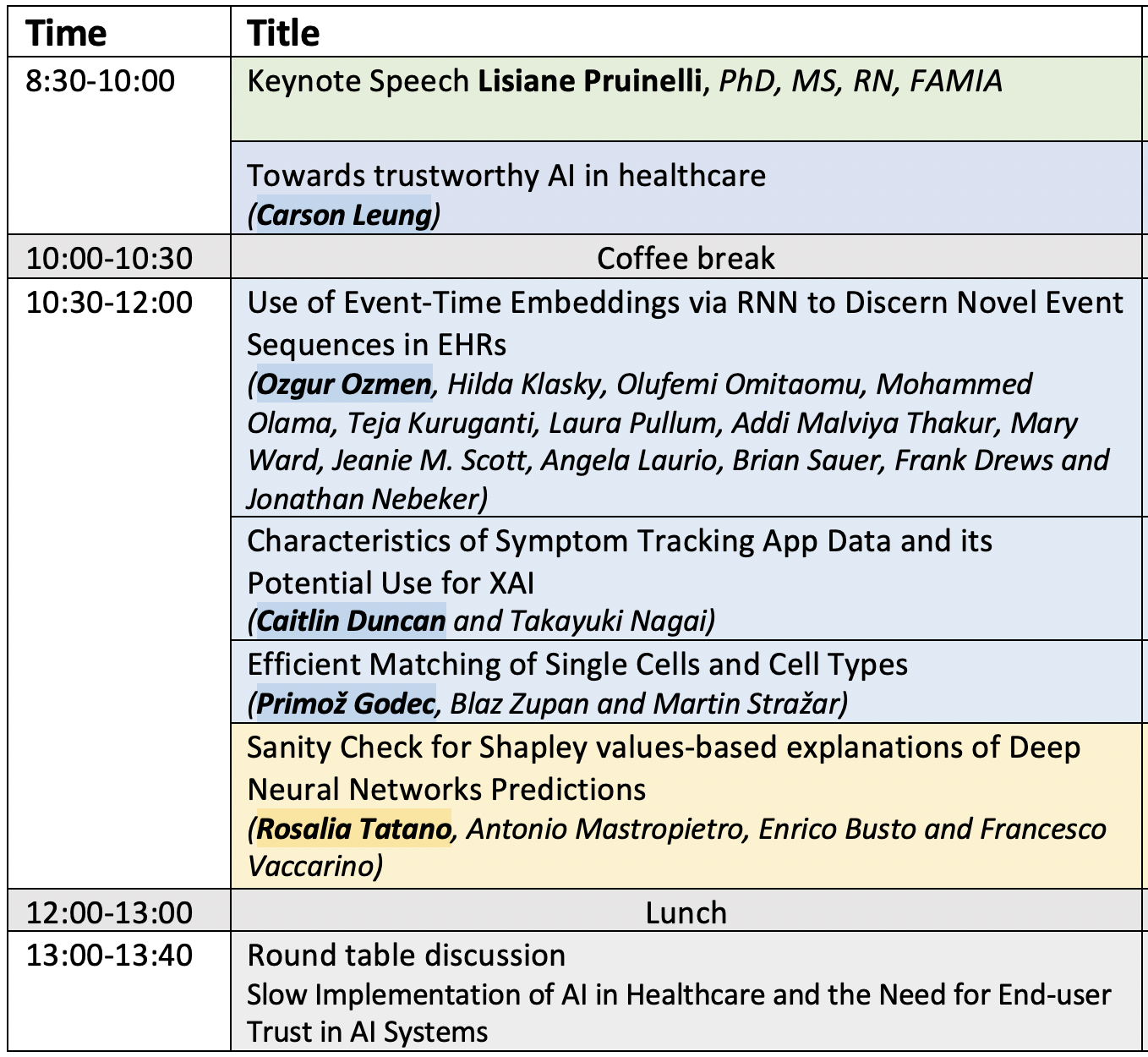PROGRAM
Full Program (PDF) is available here!
For scientific paper sessions, regular presentations have 25 minutes (20 minutes presentation and 5 minutes QA) and short presentation S have 15 minutes (12 minutes presentation and 3 minutes QA).
For poster and demo session, please follow the Presenter Guidelines.
Sessions with icon offer CME Credits. People can attend keynotes and scientific sessions with that options and they will be invited by us to participate those sessions and claim 12 hours CME credits.
Saturday, June 11
| Suite 111 | Suite 112 | Suite 113 | Suite 108 | Suite 109 | Suite 110 | Virtual | |
|---|---|---|---|---|---|---|---|
|
7:30 AM
8:30 AM
|
Registration @Suite 104
Breakfast @Suite 104 |
||||||
|
10:00 AM
|
Doctoral Consortium
|
Tutorial 1
|
Tutorial 2
|
HI-Edu 2022
|
HealthNLP 2022
|
XAI-Healthcare
|
Machine Learning in Healthcare Data for Precision Medicine
|
|
10:30 AM
|
Coffee Break @Suite 104
|
||||||
|
12:00 PM
|
Doctoral Consortium
|
Tutorial 1
|
Tutorial 2
|
HI-Edu 2022
|
HealthNLP 2022
|
XAI-Healthcare
|
|
|
1:00 PM
|
Lunch @Suite 104
|
||||||
|
2:30 PM
|
Doctoral Consortium
|
Tutorial 3
|
Tutorial 2
|
HI-Edu 2022
|
XAI-Healthcare
|
||
|
3:00 PM
|
Coffee Break @Suite 104
|
||||||
|
4:30 PM
|
Doctoral Consortium
|
Tutorial 3
|
Tutorial 2
|
||||
Sunday, June 12
|
7:30 AM
8:30 AM
|
Registration @Ballroom 1
Breakfast @Ballroom 3 |
||
|
10:00 AM
|
Welcome Session (8:30 - 9:00 AM)
Keynote: Towards Impactful Clinical Evidence Powered by Informatics and Data Science (9:00 - 10:00 AM) Dr. Chunhua Weng @Ballroom 2 |
||
|
10:30 AM
|
Coffee Break @Ballroom 1
|
||
|
12:00 PM
|
Analytics A1
ML Methodology @Suite 109 |
Analytics A2
Imaging @Suite 110 |
Analytics A3
PGHD and Text Analytics @Suite 111 |
|
1:00 PM
|
Lunch @Ballroom 3
|
||
|
2:00 PM
|
Keynote:
Leveraging Digital Therapeutics for Health Literacy: A Systems Perspective
Dr. Rema Padman @Ballroom 2 |
||
|
2:30 PM
|
Coffee Break @Ballroom 1
|
||
|
4:00 PM
|
Analytics A4
Healthcare Analytics @Suite 109 |
System S1
Design and Development @Suite 110 |
Human Factors H1
Human-centered Design @Suite 111 |
|
|
|||
|
5:30 PM
|
Poster & Demo Session
@Ballroom 1 |
||
|
6:00 PM
|
Ceremony/Banquet
@Ballroom 2/3
|
||
Monday, June 13
|
7:30 AM
8:45 AM
|
Registration @Ballroom 1
Breakfast @Ballroom 3 |
Virtual Special Session
@zoom |
Women in Healthcare Informatics
@Suite 109 |
|
9:00 AM
|
|
||
|
10:00 AM
|
Keynote:
Designing Health IT to Support Team Cognition and Clinical Work: A Human Factors and Socio-Technical Systems Approach
Dr. Ayse P. Gurses @Ballroom 2 |
||
|
10:30 AM
|
Coffee Break @Ballroom 1
|
||
|
12:00 PM
|
Analytics A5
Prediction & Classification @Suite 109 |
Systems S2
Wearables & Monitoring @Suite 110 |
Human Factors H2
Self Management @Suite 111 |
|
1:00 PM
|
Lunch @Ballroom 3
|
||
|
2:30 PM
|
Analytics A6
Event Prediction @Suite 109 |
Analytics A7
Visualization & Explainable AI @Suite 110 |
Human Factors H3
AI-based Applications @Suite 111 |
|
3:00 PM
|
Coffee Break @Ballroom 1
|
||
|
4:00 PM
|
Poster Session
@Ballroom 1 |
||
|
6:00 PM
|
Reception (Sponsored by Mayo Clinic Department of AI&I)
@Art Center |
||
Tuesday, June 14
|
7:30 AM
8:30 AM
|
Registration @Ballroom 1
Breakfast @Ballroom 3 |
||
|
10:00 AM
|
Keynote
Toward a Learning Health System: Enabling the National Knowledge Ecosystem at Scale
Dr. Blackford Middleton Panel: Bridging the gaps between academia and industry for health informatics (9:30 - 10:00) @Ballroom 2 |
||
|
10:30 AM
|
Coffee Break @Ballroom 1
|
||
|
12:00 PM
|
Industry Session
@Ballroom 2 |
||
|
|
|||
|
12:30 PM
|
Close Session
@Ballroom 2 |
||
|
|
Grab & Go Lunch @Ballroom 3
|
||
Program Details
Saturday, June 11
Doctoral Consortium
- 8:30 - 9:30 AM: Elevator speech exercise and presenta-tion.
- 9:30 - 10:00 AM: Student presentations. Students should prepare a 7minute presentation
discussing their research. We will have 3 minutes for questions.
- , Developing Natural Language Processing to Extract Comple-mentary and Integrative Health Information from Electronic Health Record Data
- , Improving Prediction and Risk Factor Analysis of Low-Weight-Birth Outcomes in a U.S. Hospital System
- 10:00 - 10:30 AM: Coffee Break
- 10:30 - 12:00 Noon: Student presentations.
- , Health information delivery using audio
- , Building Physical Activity Ontology from Electronic Health Records
- , Comprehension of Contextual Semantics Across Clinical Healthcare Domains
- , NLP system for mining social determinant of health from clini-cal notes and its fairness evaluations
- , AI for Social Good in Healthcare: Moving Towards a Clear Framework and Evaluating Applications
- , Linking Predictive and Prescriptive Analytics of Elderly and Frail Patient Hospital Services
- 12:00 - 1:00 PM: Lunch
- 1:00 - 2:30 PM: Student presentations
- , Predict Pregnancy Outcomes in the COVID-19 Pandemic Using Electronic Health Records and Machine Learning Approach
- , Using a Social, Role-playing, Simulation-Game to Build Re-silience in Adolescents
- , D-Dimer Elevation Matters to Predict COVID-19 Severity: A Machine Learning Approach
- 2:30 - 3:00 PM: Coffee break
- 3:00 - 4:30 PM: Faculty Panel.
Moderator: John Holmes, University of Pennsylvania.
Panelists: - 6:00 PM: Dinner at a local restaurant: Victoria
The 1st International Workshop on Health Informatics Education (HI-Edu 2022)
 Zoom Link for Virtual Participants:
https://tinyurl.com/4w6cwmjr
Zoom Link for Virtual Participants:
https://tinyurl.com/4w6cwmjr
Workshop Chairs:
Leming Zhou, PhD, Leming.Zhou@pitt.edu, University of Pittsburgh, US
Huanmei Wu, PhD, huanmei.wu@temple.edu, Temple University, US
- Keynote Speech (8:30 - 9:30 AM, 1 hour), William Hersh, MD, FACMI, FAMIA, FIAHSI, FACP, "Competencies and Curricula Across the Spectrum of Learners for Health Informatics"
- Invited Talk (9:30 - 10 AM, 30 minutes): Huanmei Wu, "A Data-Driven Assessment of the U.S. Health Informatics Programs and Job Market"
- Coffee Break (10:00 - 10:30 AM)
-
Paper presentations (10:30 AM - 12 PM)
Accepted Papers (20 minutes each, 15 minutes for presentation, 5 minutes for discussion)
-
Regina Merine and Saptarshi Purkayastha, (2022),
"Risks and Benefits of AI-generated Text Summarization for Expert Level Content
in Graduate Health Informatics"
-
Janusz Wojtusiak and Hua Min, (2022),
"From Undergraduate to Doctoral Health Informatics Training: A Data Focus"
-
Jay Patel, Huanmei Wu and Bari Dzomba, (2022),
"Think Outside of Box" - Ten Commandments in Providing Optimal Health Informatics Education
- Daniel Gartner, Tracey England, Doris Behrens, Izabela Spernaes, Joanne Buchanan and Paul Harper, (2022), "Evaluation of Participants' Reaction and Learning in a Taught Analytics and Modelling Academy Program in U.K.'s National Health Service"
-
Regina Merine and Saptarshi Purkayastha, (2022),
"Risks and Benefits of AI-generated Text Summarization for Expert Level Content
in Graduate Health Informatics"
- Lunch Break (12:00 - 13:30 PM)
-
Round table discussion (13:30 - 14:10 PM, 40 minutes):
Panelists:-
Andrew Nguyen, Genetech/Roche
-
David Marc, College of St. Scholastica
- Huanmei Wu, Temple University
- Dilhari DeAlmeida, University of Pittsburgh
- Cathy Fulton, Indiana University
-
Andrew Nguyen, Genetech/Roche
The 5th International Workshop on Health Natural Language Processing (HealthNLP 2022)
 Zoom Link for Virtual Participants:
https://tinyurl.com/2svdf2d8
Zoom Link for Virtual Participants:
https://tinyurl.com/2svdf2d8
Workshop Chairs: Yonghui Wu, Hua Xu
All time in US Central Time
| Time | Presentation |
|---|---|
| 8:30 - 8:40 AM |
Welcome to HealthNLP
Yonghui Wu, Hua Xu |
| 8:40 - 9:00 AM |
Developing Pretrained Language Models for Turkish Biomedical Domain
Hazal Türkmen and Oğuz Dikenelli |
| 9:00 - 9:20 AM |
Relevance of automated generated short summaries of scientific abstract: use case scenario in healthcare
Gregor Stiglic, Kasandra Musovic, Lucija Gosak, Nino Fijacko and Primoz Kocbek |
| 9:20 - 9:40 AM |
Improving Sentence Classification in Abstracts of Randomized Controlled Trial using Prompt Learning
Yan Hu, Yong Chen and Hua Xu |
| 9:40 - 10:00 AM |
Chemical-Protein Relation Extraction with Pre-trained Prompt Tuning
Jianping He, Fang Li, Xinyue Hu, Jianfu Li, Yi Nian, Jingqi Wang, Yang Xiang, Qiang Wei, Hua Xu and Cui Tao |
| 10:00 - 10:30 AM | Coffee Break |
| 10:30 - 10:50 AM |
Annotating Music Therapy, Chiropractic and Aquatic Exercise Using Electronic Health Record
Huixue Zhou, Greg Silverman, Zhongran Niu, Jenzi Silverman, Roni Evans, Robin Austin and Rui Zhang |
| 10:50 - 11:10 AM |
A Preliminary Study of Extracting Pulmonary Nodules and Nodule Characteristics from Radiology Reports Using Natural Language Processing
Shuang Yang, Xi Yang, Tianchen Lyu, Xing He, Dejana Braithwaite, Hiren Mehta, Yi Guo, Yonghui Wu and Jiang Bian |
| 11:10 - 11:30 AM |
Integrating Medical Code Descriptions and Building Text Classification Models for Diagnostic Decision Support
Rui Tang, Zhaowei Zhu, Haishen Yao, Yanxuan Li, Xingzhi Sun, Gang Hu, Yichong Li and Guotong Xie |
| 11:30 - 11:50 AM |
Canine parvovirus diagnosis classification utilizing veterinary free-text notes
Zhecheng Sheng, Emma Bollig, Jennifer Granick, Rui Zhang and Amanda Beaudoin |
| 11:50- 12:10 PM |
Terminology Expansion via Co-occurrence Analysis of Large Clinical Real-World Datasets
Markus Kreuzthaler, Bastian Pfeifer and Stefan Schulz |
The 2nd International Workshop on eXplainable Artificial Intelligence in Healthcare
 Zoom Link for Virtual Participants:
https://tinyurl.com/36wa6j8c
Zoom Link for Virtual Participants:
https://tinyurl.com/36wa6j8c

The 2nd Machine Learning in Healthcare Data for Precision Medicine
Workshop Chair: Sultan Turhan
| Time | Presentation |
|---|---|
| 9:00 - 9:15 | Welcome |
| 9:15 - 9:35 |
Keynote Speech
Sultan Turhan |
| 9:35 - 9:55 |
3864 - An xAI Thick Data Assisted Caption Generation for Labeling Severity of Ulcerative Colitis Video Colonoscopy
Jinan Fiaidhi |
| 9:55 - 10:15 | 8693 - Value-Based Healthcare Translational Data Analytics using the Problem Oriented Medical Record Graph Representation
Sabah Mohammed |
| 10:15 - 11:45 | Coffee Break |
| 11:45 - 12:05 | 6411 - Improving Prediction and Risk Factor Analysis of Low Birthweight Baby Outcomes in a U.S. Hospital System Yang Ren |
| 12:05 - 12:25 | 6513 - Using D-dimer as a Biomarker to Predict COVID-19 Disease Severity from Clinical Data of Hospitalized Patients: A Machine Learning Approach Yuqi Wu |
| 12:25 - 12:45 | 7570 - Acute Kidney Injury Prediction with Gradient Boosting Decision Trees enriched with Temporal Features Stela Golovco |
| 12:45 - 13:00 | Closing Remarks |
Tutorial 1: Computational Drug Target Prediction: Benchmark and Experiments
 Zoom Link for Virtual Participants:
https://tinyurl.com/52uev6s9
Zoom Link for Virtual Participants:
https://tinyurl.com/52uev6s9
Dr. Nansu Zong and Dr. Victoria Ngo
Despite the rapid development of a variety of biological assays improving the efficiency of drug screening, the potentially large number of combinations of drugs and targeted proteins make experimental screening remain laborious and expensive. As such, computational (in silico) methods have become popular and are commonly applied for pre-screening. This tutorial will provide participants with experience in conducting computational experiments for drug target predictions.
In the tutorial, the participants will firstly theoretically review the history of computational drug target prediction. The methods, datasets, and how the experiments are designed will be introduced. Later, the participants will be introduced to a data set, Linked Multipartite Network (LMN), a heterogeneous network that incorporates 12 repositories and includes 7 types of biomedical entities (#20,119 entities, # 194,296 associations). The participants will learn how to use LMN to facilitate drug target prediction, including computational validation, and facilitate scientific discovery. Finally, participants will be introduced to some state-of-the-art computational methods, and practice the adoption of these methods to conduct the experiments by running the tasks with the given training and testing files generated in the LMN.
Through the proposed tutorial, participants, such as researchers and trainees, will understand the process of computational drug-target prediction and further learn how to adopt LMN as the dataset to facilitate the drug target prediction in practice as well as apply those skills in future studies.
Tutorial 2: Prescriptive Healthcare Analytics: a Tutorial on Discrete Optimization and Simulation
 Zoom Link for Virtual Participants:
https://tinyurl.com/2xzma3zs
Zoom Link for Virtual Participants:
https://tinyurl.com/2xzma3zs
Dr. Elizabeth M. Williams, Dr. Paul R. Harper and Daniel Gartner
There has been recognition of the role that mathematical modelling and Operational Research (OR) have to play in decision making in healthcare. For the last 20 years and even more so than during the recent pandemic, mathematical models have been used for demand and capacity planning across many healthcare services including primary, secondary care and healthcare logistics. In this tutorial, we will provice an overview of different mathematical modelling techniques applied to healthcare but with a particular focus on two paradigms: Discrete Optimization as part of Mathematical Programming and Discrete Event Simulation. Participants will learn how to formulate models mathematically, implement them in Microsoft Excel and use non-commercial solvers to provide solutions of the models. Because in this first part, rather deterministic models are presented, we will introduce the concept of variation in a second part using Discrete Event Simulation.
Tutorial 3: Data Science for Healthcare via an E-Learning Statistics Platform
 Zoom Link for Virtual Participants:
https://tinyurl.com/52uev6s9
Zoom Link for Virtual Participants:
https://tinyurl.com/52uev6s9
Dr. Philipp Burckhardt, Dr. Saba Al-Sayouri and Dr. Rema Padman
In this tutorial, participants will discover how the ISLE e-learning platform can be used to deliver health informatics and analytics instruction.
Tutorial attendees will learn how to build lessons with ISLE through the accompanying authoring tool and how to monitor student progress and performance. In addition, we will discuss how to use clickstream data to improve material on the fly and iteratively improve subsequent lessons. No matter the mode of delivery, attendees will leave with a clear understanding of how to leverage hands-on activities and data analysis exercises to foster understanding of statistical concepts and skills.
Sunday, June 12
Welcome Session
General Chairs: Hongfang Liu and Ravishankar K Iyer
Welcome Talk: Digital Transformation in Medicine: Past, Cur-rent and Future of Informatics and Technology at Mayo Clinic
James D. Buntrock
 Abstract: In this welcome talk, I will provide a brief history of Mayo Clinic and highlight integrated medicine, informatics, and selected innovations. We will describe the critical roles played by IT, engineering, data science, informatics, and AI in the care of the tomorrow envisioned by Mayo Clinic's 2030 Cure Connect Transform strategy. I will summarize the opportunities and challenges faced in our mission which will require strong partnership from the technology and engineering communities.
Abstract: In this welcome talk, I will provide a brief history of Mayo Clinic and highlight integrated medicine, informatics, and selected innovations. We will describe the critical roles played by IT, engineering, data science, informatics, and AI in the care of the tomorrow envisioned by Mayo Clinic's 2030 Cure Connect Transform strategy. I will summarize the opportunities and challenges faced in our mission which will require strong partnership from the technology and engineering communities.
Keynote:
Towards Impactful Clinical Evidence Powered by Informatics and Data Science
Dr. Chunhua Weng
 Abstract: Robust clinical evidence is the foundation to evidence-based medicine (EBM). However, our clinical research enterprise faces multiple challenges and the PubMed evidence base is fraught with free-text evidence of mixed quality, preventing evidence adoption among clinicians and reducing the trust in science among patients. In this talk I will provide a high-level overview of my lab's research on developing informatics and data science methods to improve the impact of clinical evidence resulting from clinical trial research, spanning the continuum from evidence generation to evidence dissemination. I will cover issues such as informatics-based diversity optimization for clinical research enrollment, data-driven eligibility criteria optimization, scalable clinical evidence extraction and representation, and automated conflicting evidence detection for published clinical trial studies. I will conclude with research opportunities to developing informatics and data science methods to improve the robustness and computability of clinical evidence.
Abstract: Robust clinical evidence is the foundation to evidence-based medicine (EBM). However, our clinical research enterprise faces multiple challenges and the PubMed evidence base is fraught with free-text evidence of mixed quality, preventing evidence adoption among clinicians and reducing the trust in science among patients. In this talk I will provide a high-level overview of my lab's research on developing informatics and data science methods to improve the impact of clinical evidence resulting from clinical trial research, spanning the continuum from evidence generation to evidence dissemination. I will cover issues such as informatics-based diversity optimization for clinical research enrollment, data-driven eligibility criteria optimization, scalable clinical evidence extraction and representation, and automated conflicting evidence detection for published clinical trial studies. I will conclude with research opportunities to developing informatics and data science methods to improve the robustness and computability of clinical evidence.
A1 Analytics Session 1: ML Methodology
A2 Analytics Session 2: Imaging
A3 Analytics Session 3: PGHD and Text Analytics
Keynote Speech 2
Leveraging Digital Therapeutics for Health Literacy: A Systems Perspective
Dr. Rema Padman
 Abstract: Health literacy is a widely recognized challenge for public health, with many adults lacking the requisite skills to engage successfully in the management of their health and healthcare. Affecting both individual and societal health outcomes, it particularly exacerbates the increasing physical and psychological burden for patients with multiple health conditions as well as the elderly and disadvantaged populations. Recent developments in digital therapeutic solutions offer an opportunity to apply systems thinking and perspectives to synthesize the myriad components of a multi-pronged approach to improving societal health literacy at scale. This talk will highlight some of these developments with a focus on digital platforms and algorithmic artifacts in the healthcare delivery setting, recognizing the challenges of misinformation and disinformation in identifying and disseminating authoritative and accurate content for educating and empowering patients and the public.
Abstract: Health literacy is a widely recognized challenge for public health, with many adults lacking the requisite skills to engage successfully in the management of their health and healthcare. Affecting both individual and societal health outcomes, it particularly exacerbates the increasing physical and psychological burden for patients with multiple health conditions as well as the elderly and disadvantaged populations. Recent developments in digital therapeutic solutions offer an opportunity to apply systems thinking and perspectives to synthesize the myriad components of a multi-pronged approach to improving societal health literacy at scale. This talk will highlight some of these developments with a focus on digital platforms and algorithmic artifacts in the healthcare delivery setting, recognizing the challenges of misinformation and disinformation in identifying and disseminating authoritative and accurate content for educating and empowering patients and the public.
A4 Analytics Session 4: Healthcare Analytics
S1 System Session 1: Design and Development
H1 Human Factors Session 1: Human-centered Design
Poster & Demo Session
Board Number: X
Monday, June 13
Virtual Special Session
Open disscusion
Women in Healthcare Informatics
Keynote:
Designing Health IT to Support Team Cognition and Clinical Work: A Human Factors and Socio-Technical Systems Approach
Dr. Ayse P. Gurses
 Abstract: Health care is increasingly provided in team-based environments, yet little is known about how to design health IT solutions that support care team members' cognition (e.g., information needs, problem detection, communication, coordination, etc.) and clinical work. This is especially true for time-pressured, high-risk, high stakes care situations such as trauma care that involves multiple specialties, and is provided in multiple care locations (e.g., trauma bay, operating room, intensive care unit). In this presentation, I will first discuss how we used a human factors and a socio-technical systems approach to characterize the team work involved in caring for pediatric trauma care patients, including barriers to and enablers for team cognition. I will then describe the human-centered design approach we used to develop a team-centric health IT to support pediatric trauma care. Finally, I will conclude my talk with some health IT design considerations and recommendations for supporting health care team work and 'lessons learned' from our human-centered design process.
Abstract: Health care is increasingly provided in team-based environments, yet little is known about how to design health IT solutions that support care team members' cognition (e.g., information needs, problem detection, communication, coordination, etc.) and clinical work. This is especially true for time-pressured, high-risk, high stakes care situations such as trauma care that involves multiple specialties, and is provided in multiple care locations (e.g., trauma bay, operating room, intensive care unit). In this presentation, I will first discuss how we used a human factors and a socio-technical systems approach to characterize the team work involved in caring for pediatric trauma care patients, including barriers to and enablers for team cognition. I will then describe the human-centered design approach we used to develop a team-centric health IT to support pediatric trauma care. Finally, I will conclude my talk with some health IT design considerations and recommendations for supporting health care team work and 'lessons learned' from our human-centered design process.
A5 Analytics Session 5: Prediction & Classification
S2 System Session 2: Wearables & Monitoring
H2 Human Factors Session 2: Self Management
A6 Analytics Session 6: Event Prediction
A7 Analytics Session 7: Visualization & Explainable AI
H3 Human Factors Session 3: AI-based Applications
Poster Session
Same schedule as the Poster and Demo Session on Sunday, June 12
Tuesday, June 14
Keynote: Toward a Learning Health System: Enabling the National Knowledge Ecosystem at Scale
Dr. Blackford Middleton
 Abstract: In this talk, Dr. Middleton will highlight the essential informatics building blocks of an enabled Learning Health System, and key AI-driven components. He will talk first about modern clinical information needs, his early experiences building CDS tools in EHR, the central problem of knowledge exchange between EHRs, and the concerns regarding evaluation of a man-machine (AI)-patient triad in decision making going forward. If a shared vision is adopted across industry and academe, and enabled, he will describe one possible result: a National Knowledge Ecosystem to support a LHS.
Abstract: In this talk, Dr. Middleton will highlight the essential informatics building blocks of an enabled Learning Health System, and key AI-driven components. He will talk first about modern clinical information needs, his early experiences building CDS tools in EHR, the central problem of knowledge exchange between EHRs, and the concerns regarding evaluation of a man-machine (AI)-patient triad in decision making going forward. If a shared vision is adopted across industry and academe, and enabled, he will describe one possible result: a National Knowledge Ecosystem to support a LHS.
Panel: Bridging the gaps between academia and industry for health informatics
Dr. Blackford Middleton, Dr. Andrew Nguyen, Dr. Prasanna Desikan, Dr. Xia Hu
Industry Session
Close Session